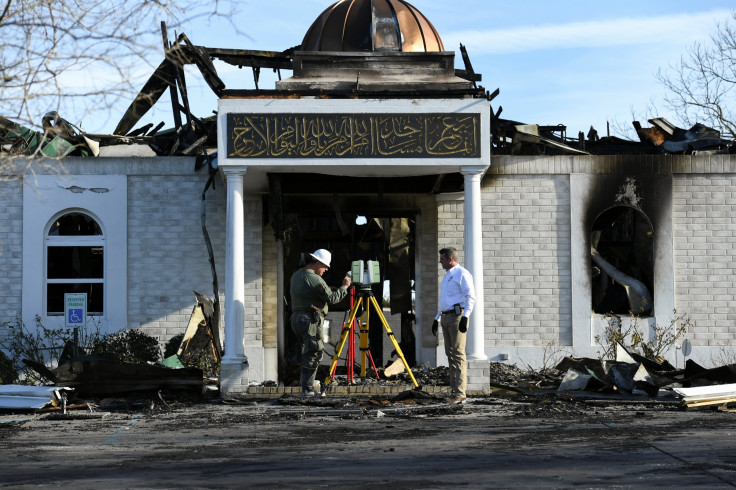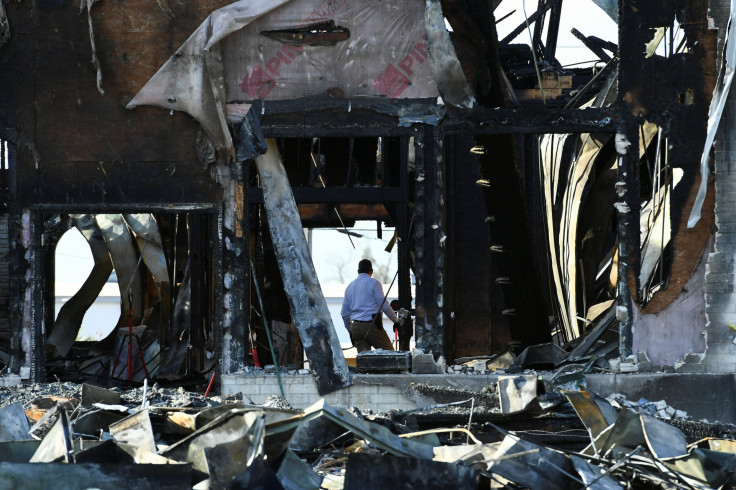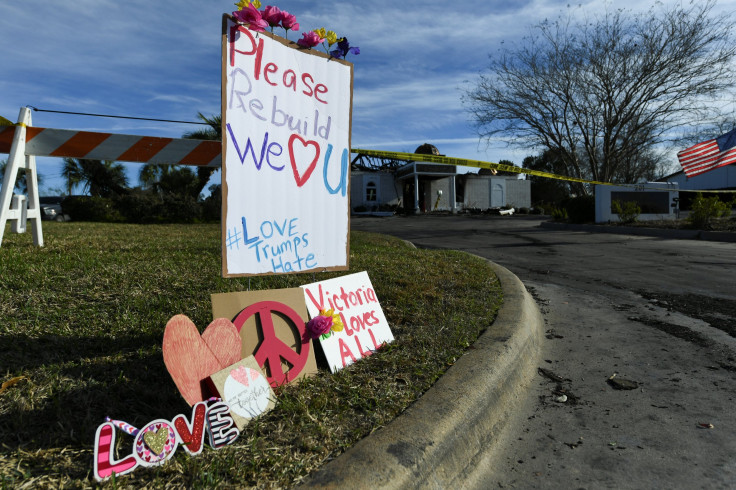After Texas Mosque Burned Down, Leader Defends Trump Immigration Ban

The Muslim community in Victoria, Texas, holds a communal dinner every Friday night at the Victoria Islamic Center and last week was no different. They ate, cleaned up and headed home prepared to return the following day for prayer. But when members arrived the next morning, they find their beloved mosque gutted and charred.
“The entire building was destroyed,” Shaid Hashmi, president of the Victoria Islamic Center, told International Business Times.
Saturday’s fire came hours after President Donald Trump signed an executive order barring citizens of seven Muslim-majority countries from entering U.S. soil. The mosque's destruction made national headlines after some assumed the fire was caused by individuals who sided with Trump's decision.
But after months of Muslims leaders around the nation sounding the alarm about growing incidents of hate crime and Trump's increasingly divisive rhetoric toward Islam, Hashmi remains convinced the blaze wasn’t a hate crime. And he wants people to stop claiming it was.
"It could perhaps be an electrical problem from inside," he said. “We don’t know the situation right now … don’t know if it was set intentionally or if it was an accident.”
Trump's executive order last week restricting people from Iraq, Syria, Iran, Libya, Somalia, Sudan and Yemen from traveling to the U.S. has sparked demonstrators across the nation, with protesters calling the ban inhumane and racist. Democratic lawmakers and 16 attorneys generals released a statement condemning the order as unconstitutional. Some Republicans, including Sens. John McCain and Lindsey Graham, have also criticized the order, while Washington, Massachusetts and New York plan to sue the Trump administration over the policy.
No theories yet from fire marshal about how a Victoria mosque was engulfed in flames early Saturday morning. pic.twitter.com/5vJjHYiZra
— Jon Wilcox (@thrilcox) January 28, 2017
But Hashmi said he has no problems with the executive order. He described it as Trump’s way of thinking “of security for the country,” even though he also stressed that he doesn't want all Muslims to be labeled as terrorists or "bad" people.
“The president has chosen to restrict certain countries, he is our president. I respect his decision, unless if it comes to the point where it will hurt innocent people, then we won’t support that,” he said. “Just because Muslims made the terrorist attack in the past that doesn’t mean every Muslim is bad. It’s not religious fault; it’s those people who are not following their true fate. Muslims are good people.”
Asked if he had any suspicions about whether someone might have caused the arson after Trump's order, Hashmi demurred. “I’m not going to get political about it. There is no reason to get political about it at all,” he said.
Hasmi's mosque counts about 100 members in Victoria, a small city about 125 miles southwest of Houston. Emergency workers arrived at the mosque Saturday after a neighbor called the fire department when he noticed smoke and flames coming out from the structure. The mosque's imam, Osama Hassan, woke up randomly from his sleep and checked the online surveillance of the mosque on his phone. He saw the doors were unlocked, Hashmi said. When Hassan went down to the mosque, he noticed the fire department was already outside trying to tame the blaze.
Hassan, who spent most of his time at the mosque, called Hashmi to tell him about the fire. “He was crying like a child when he called me,” said Hashmi.
The mosque opened in 2000 and is the only gathering place for local Muslims. Its small membership is a good fit because Victoria is a “small city, everything is near,” Hasmi said.
Victoria is 79 percent white, 43 percent Latino or Hispanic, 6 percent black and 10 percent some other race, according to U.S. Census data. In 2000, 271 Muslims were living in the area, which is known for its agricultural and industrial economy.
People in the community “have been very good to us, and we have been good to them,” said Hasmi, a surgeon who has lived in the area for 32 years and claims to have performed surgery on most of the city's residents. He said he has never experienced any discrimination personally in the community. In fact, after the fire, neighbors offered up a temporary place for Muslims to continue their religious services, Hashmi said.
“The kids came here to play, study and learn. Now, they are devastated. They don’t know why this building is gone,” he said.
A GoFundMe campaign to help rebuild the Victoria Islamic Center had raised as of Tuesday afternoon more than $900,000 from more than 20,000 people.
“Our hearts are filled with gratitude for the tremendous support we've received. The outpouring of love, kind words, hugs, helping hands and the financial contributions are examples of the true American Spirit and Humanity at its best with donations coming in from all over the world,” a message on the fundraising page reads.
The mosque was the subject of an attack just four years ago. In 2013, a man admitted to painting "H8" on the outside of the center, the Victoria paper reported. More recently, someone burglarized the mosque in January, stealing some of Hassan’s electronics, including phones and laptops. Hashmi said he “cannot speculate whether these two incidents are connected.”
“God does things for certain reasons, and he has the best interest for us,” he said.

But for many Muslims across the nation, hate crimes have become somewhat of a new normal. A recent FBI hate crime statistic report shows that anti-Muslim incidents jumped 67 percent from 2014. There were 257 reported bias crimes against Muslims in 2015, compared with 154 in 2014.
The Southern Poverty Law Center (SPLC) reported 701 incidents of harassment, with an uptick in reported incidents taking place after Election Day in November. Of 206 anti-immigrant incidents reported, 51 were anti-Muslim.
After the Texas mosque was consumed by flames, police arrested a suspect in Quebec City for a Mosque attack that killed six people and left 17 wounded during evening prayers. Canadian Prime Minster Justin Trudeau and Quebec premier Phillippe Couillard called Sunday’s incident a “terrorist attack on Muslims.” Alexandre Bissonnette, the alleged suspect, was charged Monday with six counts of first-degree murder and five counts of attempted murder for opening fire at the Quebec Islamic Cultural Center.

Before that, anonymous letters were sent to three California mosques in November indicating that once elected, Trump would “cleanse” the United States of Muslims by doing what Adolf Hitler “did to the Jews.” The letters, which were all handwritten and photocopied, were first mailed to Evergreen Islamic Center in the Northern California city of San Jose. The Islamic centers of Long Beach and Claremont in Southern California later received a similar letter.
Trump will “cleanse America and make it shine again,” the letter read.
In Texas, the local branch of the Council on American-Islamic Relations said it was monitoring the fire investigation at the Victoria mosque.
"Because of growing anti-Muslim bigotry in our nation, and because of the recent spike in hate incidents targeting Islamic institutions and individuals, we urge investigators to keep the possibility of a bias motive for this fire in mind," CAIR-Houston Executive Director Mustafaa Carroll said.
The Islamic Center of Victoria at 201 E. Airline Rd is fully engulfed in fire. A clerk at nearby Exxon station said he called 911 abt 2 a.m. pic.twitter.com/yc9akLNfnq
— Jon Wilcox (@thrilcox) January 28, 2017
But for Hashmi, who called the mosque his "baby," the primary focus in recent days has been finding out what caused Saturday’s fire, not pointing fingers based on headlines or statistics.
“We’re just trying to find out what happened to the community,” he said.
© Copyright IBTimes 2025. All rights reserved.






















